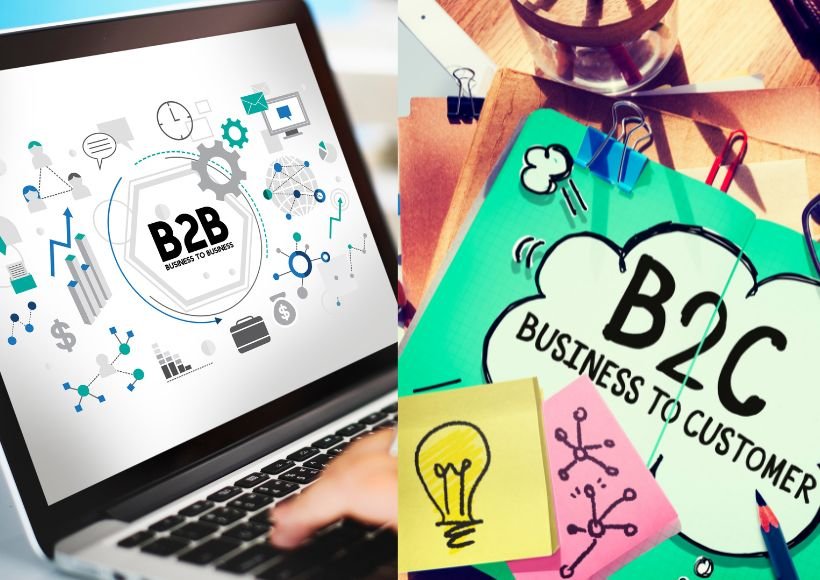Are B2C And B2B Marketing The Same?

Do B2C And B2B Share Anything In Common Anyone who denies the truth that at their core, deeply down a consumer is a customer truly missing an important part of motivating and connecting with human beings in some way or form.
Nah, they are not the same as B2C & B2B marketing. They are the ways of marketing that have to do with who is being targeted and what kind of business relationship exists between these parties.
B2C (Business to Consumer) — refers strictly in buying products/services by an individual consumer. There is no other point, the whole purpose of this activity is to create a brand image and to generate interest among consumers that results into sales.
B2C marketing generally uses the mass advertising, social media and such strategies to create brand-awareness among common consumers. They show more what you feel when using the product, some benefits of that and messages are written not in neutral tone but personalized to weapons — after all- it is a needs thing.
Meanwhile, B2B stands for Business-to-Business and targets business entities to be their customers. Our goals are to create connections, show non-final value and get leads for a long-term cooperation. To most of y’all, the personalization part is usually limited to stuff like direct sales, networking and industry events or maybe messaging that’s tailored a bit different than those beforementioned for individual businesses in content marketing. These messages revolve around how a product or service can provide relief to the business challenges, enhance efficiencies or increase profits suffered by customers.
Marketing Tips and Strategies for your business can come from B2C marketing however, the similarities are little to nothing other than principles of salesmanship. B2C marketing focuses on their individual customers and the emotional connections to products, while B2B marketers care about building relationships as well fulfilling business requirements.
Table of Contents
More Info On B2C And B2B Marketing
B2C Marketing
Target aspect: B2C marketing deals with the single consumer, end-user or customer. Its target audience can be broad, spanning different demos, niches and purchase behaviors.
Number of Transactions: B2C transactions have smaller order sizes, but often higher transaction volumes due to a larger customer base.
Decision-Making: For B2C businesses, the purchase decision mostly depends on emotions and personality preference in addition to convenience and affordability. Consumers have shorter consideration cycles and are more impulse buyers.
Channels: B2C marketing channels include mass media advertising, online and social media ads, search engine marketing (SEM), influencer teaching, sales promotions like file displays in retail stores or trade shows.
Branding: B2C marketing is all about building your brand image and creating consumer loyalty. Branding is essential to make products stand out from rivals and impact purchase decisions by consumers.
B2B Marketing
Target Market: B2B marketing cater for the businesses, organizations and professionals that purchase goods or services. The target is decision-makers, procurement managers and other key persons in the purchase process.
Build Relationships: When it comes to B2B marketing, the main thing is relationship building. This involves building trust, showcasing skill and mastery within the realm of this business and getting to grips with its individual needs comedyitunes.com, goals & battles.
Length of Sales Cycle: B2B sales cycles are typically longer and more complicated, compared to B2C. There are many persons involved, they evaluate and negotiate. The two built an infant relationship where communication proved most vital.
Marketing Channels: Direct sales, trade shows, industry events and networking as well as email campaigns; whitepapers and case studies for content marketing efforts along with webinars through professional channels like LinkedIn.
Rational Reasoning’s: B2B purchase decisions are often the result of rational choices chasing higher returns (ROI), competitive prices, economical effectiveness, capacity and quality recognition. B2B marketing points out the benefits and shows how a product or service is within business goals.
Conclusion
While B2C and B2B marketing differ from one another, it is true that there are exceptions to this rule. Looks B2C vs. Both: Some commerce can serve consumers directly or businesses at the same time.
In this case, they frequently must make adjustments to their marketing strategies in order to meet the unique needs of every target audience.
Also Read : How To Use B2B SEO Strategies To Generate High Quality Leads
